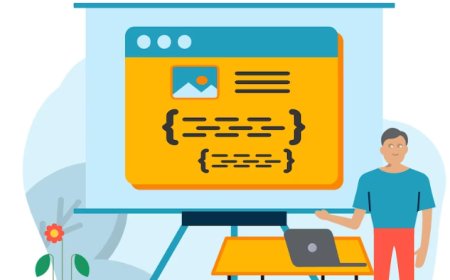Top 10 Python Features
Discover the top 10 Python features that make it a favorite among programmers for its simplicity and versatility

Python is a popular programming language among developers due to its great features, simplicity, and flexibility. It is sometimes referred to as the Swiss Army knife of programming languages. Python takes pleasure in having a syntax that is simple to read and understand, making it a great choice for individuals who are just beginning to code. Python is a powerful tool for getting things done, so don't let its simplicity deceive you. Python's rich library ecosystem and user-friendly architecture allow it to perform a wide range of tasks with ease, from web development to data analysis, and machine learning to automation.
Python's accessibility is one of its best qualities; it promotes teamwork and speed development. Compared to other languages, its concise and clear syntax helps developers to explain concepts in fewer lines of code, increasing productivity and decreasing the chance of errors. Moreover, Python's community-driven methodology guarantees a variety of tools, tutorials, and help at all times, creating a friendly atmosphere for developers of all experience levels. Regardless of your level of experience, Python provides a friendly and powerful environment for you to realize your ideas.
Imagine yourself as a young programmer who is excited to learn more about the world of coding. Although you've heard that Python is a simple-to-use and flexible language, you're not sure where to begin. There are so many possibilities available to you, ranging from data analysis to web development, and you're not sure which one to choose. You need a language that is both simple to learn as well as capable of handling whatever task you throw at it.
Python turns out to be the ideal answer. Beginners may easily learn the fundamentals of programming with its clear and straightforward syntax, and the huge ecosystem offers resources for nearly any work. Python offers the resources you need to be successful, whether you're creating a website, analyzing data, or automating tedious chores. You may start your coding path with confidence when you have Python by your side because it's a flexible and strong language.
The challenge of selecting the most essential features
-
Crushing Options: Picture yourself visiting a candy store where there are so many sweets to select from that it will be difficult to make a decision. Similar to the variety of candy flavors available to developers, Python offers a wide range of methods and tools. Selecting the ideal ones for a certain job can be very difficult.
-
Complexity vs. Simplicity: Sometimes the most visually appealing candies—such as large lollipops that take an eternity to consume are also the toughest to consume. Like those giant lollipops, some capabilities in Python could look incredibly strong and cool, but they can also be difficult to learn and utilize. Simpler candies, such as plain chocolate bars, are still tasty even when they aren't as showy.
-
Project Requirements: different projects have distinct requirements, much as some people love sour candy while others prefer sweet ones. For instance, a website construction project can require characteristics that allow it to manage large volumes of traffic, but a data analysis project might require capabilities that enable it to function extremely quickly. Developers must decide which features will best enable the project to accomplish its goals and consider what the project must do.
-
Resource Restrictions: Suppose you have to make judicious decisions at the candy store since you only have a certain amount of money to spend. In a similar vein, developers frequently have constraints on the amount of time, money, and personnel they can assign to a project. To complete the project, they must choose the features that offer the best value for the money.
-
Compatibility and Integration: Certain features in Python must get along with other components of the project, just like some candies pair well together, like chocolate and peanuts. When adding new features, developers need to consider how well they will work with the existing features and verify that there won't be any issues.
-
Future-proofing: Last but not least, future-proofing involves considering potential outcomes, much like how you would decide to preserve part of your sweets for later rather than consuming it all at once. When choosing features for Python, developers should think about whether or not they will remain relevant and useful in the future, even as things change and new technologies are developed.
What are the top 10 features that make Python stand out among programming languages?
- Readability: Python's straightforward syntax makes code written in the language resemble ordinary English, which makes it simpler for both novice and seasoned engineers to understand what the code does. It is easier to identify mistakes and comprehend how various code components interact thanks to its readability.
- Versatility: Consider Python as having a large variety of tools in its toolbelt. In addition to building websites and analyzing data, you can use it to teach computers new skills, automate repetitive chores, and much more. It saves time and effort to learn several languages when you have one language that can handle a wide range of tasks.
- Large Standard Library: Imagine Python as having a large box of Lego parts, each of which represents a pre-made solution to a common issue. The modules and packages that make up Python's standard library are these Lego parts. Instead of having to create everything from scratch, they offer shortcuts for tasks like managing dates and times, working with files, and even accessing the internet.
- Dynamic Typing and Interpreted Nature: Consider Python as a highly type-aware language. Python does the work to determine the type of data an object is, unlike some other languages where you have to declare it (e.g., "this is a word" or "this is a number"). Furthermore, Python does not require compilation into machine code to execute; instead, it can expedite development since it functions as a kind of real-time code translation tool.
- Community Support: There is a large Python user base that enjoys exchanging expertise. This implies that there's probably someone out there who can assist you if you're having trouble solving a problem or would like to learn something new. Python lovers come together to share ideas and support one another via conferences, forums, and tutorials.
- Object-Oriented Programming: You can structure your Python code similarly to building building pieces. Using an approach known as object-oriented programming, you can write reusable code units called objects, which facilitate the management and growth of your programs.
-
Robust Ecosystem: The ecosystem surrounding Python is so beautiful because it meets a wide range of requirements and interests. There's something for everyone, be it a web developer, data scientist, or AI enthusiast. Python serves as the hub of this marketplace, giving developers a common language and platform to communicate and work together on projects.
-
Ease of Extensibility: Because of Python's great extensibility, adding new features to the language is as easy as utilizing code written in other languages. This increases Python's capabilities even further and facilitates program interoperability. Let's say you have a simple Lego set.
-
Interpreted Nature: Because Python is a language that is you don't need to build it before running Python code. It's similar to having a chef who can start cooking as soon as you give them the recipe and doesn't require any preparation.
-
Active Community: People who enjoy working with Python come from all over the world and form a vibrant community. Over time, they collaborate, exchange ideas, and improve Python. It resembles being a part of a large group of friends who are always encouraging and improving one another.
Python is unique among programming languages because of its amazing capabilities, ease of use, and adaptability. Because of its readability which is similar to that of ordinary language coding is understandable to both novice and experienced coders. Python's versatility makes it capable of handling a wide range of activities, including data analysis, automation, and web development. As a complete answer for a variety of programming needs, Python saves time and effort. Furthermore, Python's extensive standard library offers ready-made answers to often-encountered issues, augmenting its effectiveness and user-friendliness even more. Because of its interpreted nature, dynamic typing, and robust community, Python provides developers of all skill levels with a powerful and welcoming environment in which to realize their ideas and projects.





































